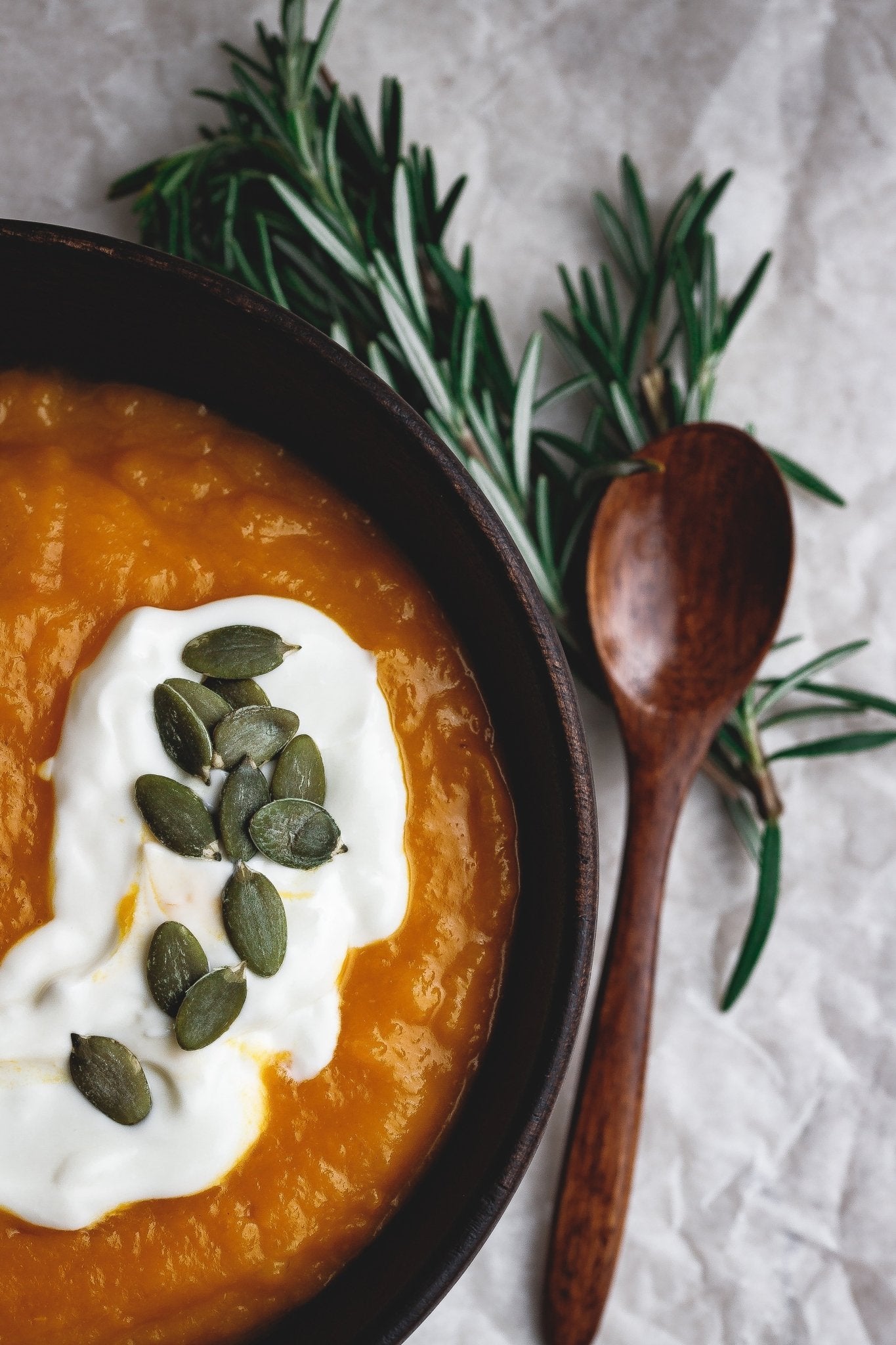The season of falling leaves, cozy sweaters, and apple picking is upon us! As you switch your wardrobe to account for the cooler weather, why not refresh your pantry, too?
Autumn has a cornucopia of vibrant, in-season produce to offer. And, if the comforting Fall flavors aren’t enough to entice you, eating seasonally is a simple way to reduce your environmental impact. Keep reading to learn all about it.
The Benefits of Eating In-Season Produce
While we can enjoy all types of produce year-round with the remarkable selection in big-name grocery stores, seasonal produce offers undeniable benefits for the planet, local farmers, your health, and your taste buds.
- Eating seasonally omits the need to transport out-of-season produce from other regions of the world. This reduces greenhouse gasses emitted by large cargo vehicles.
- Purchasing seasonal produce from nearby farmer’s markets bolsters your local economy (and may even save you money!).
- When produce is harvested in its peak season, it has the time to mature properly in an optimal environment, leading to superior nutrition and flavor.
Autumnal In-Season Produce
While summer boasts many in-season favorites, like berries and watermelon, autumn is the time for vibrant, warming flavors. Here are a few delectable, naturally nutrient-dense picks to add to your pantry this fall:
Sweet Potatoes
Sweet potatoes can round out your meal as a filling starch, but offer far greater health benefits than your average white potato or serving of rice. These bright orange root vegetables pack an impressive dose of fiber, potassium, and vitamins A, C, and B6. Sweet potatoes are also rich in free radical-fighting antioxidants that support your vision, promote gut health, and may even help slow the growth of cancer cells.
Other perks of adding sweet potatoes to your autumn meal lineup include:
- Natural blood sugar stabilization
- Digestive support with soluble fiber
- Reduced systemic inflammation
Brussels Sprouts
Brussels sprouts are a classic side for holiday meals. But, with their far-reaching health benefits, these little sprouts deserve to take center stage on your plate this fall. As a cruciferous veggie, Brussels sprouts are rich in fiber, vitamin K, vitamin C, and carotenoids (potent antioxidants that prevent eye disease and some cancers).
Add Brussels sprouts to your regular meal plan this fall for:
- Digestive support from fiber
- Reduced inflammation from antioxidants
- Enhanced immunity from vitamin C
- Improved bone health from vitamin K
Cranberries
Many people only enjoy cranberries as a sauce at Thanksgiving. However, these autumn berries deserve more credit for their ability to naturally prevent urinary tract infections, cavities, and even certain cancers. These benefits are thanks to the A type proanthocyanidins in cranberries, a class of flavonoids with potent antioxidant benefits.
A type proanthocyanidins are only found in cranberries, making them a unique and often underestimated superfood. If you struggle to include these berries in your diet due to their tart flavor profile, consider these ideas:
- Stir them into your morning oatmeal with cinnamon and a drizzle of honey.
- Blend them into a smoothie with yogurt and a banana.
- Toss them through a salad with arugula, walnuts, and goat cheese.
- Mix them into turkey meatballs with sage.
Apples
Apples may be a humble fruit, but autumn is their time to shine. No matter your favorite variety, apples provide a high dose of antioxidants (namely quercetin) and fiber. Quercetin is an antioxidant found in pigmented fruits and veggies that helps ease inflammation and protect against cell damage. The fiber in apples promotes digestive comfort and helps keep you fuller for longer.
Other notable health benefits of apples include:
- Promotes a healthy microbiome with quercetin to prevent the growth of “bad” bacteria and pectin to act as a prebiotic
- Reduced blood pressure from the antioxidants in apple peels
- Reduced cholesterol from pectin, which attaches to cholesterol in the digestive tract and removes it from the body
Pumpkin
Pumpkins are the quintessential image of Fall. But, this squash is far more than a canvas for jack-o-lanterns. Pumpkin is rich in vitamin A, vitamin C, potassium, fiber, and antioxidants in the form of carotenoids. These naturally-occuring nutrients offer support for many facets of your wellness, including your immunity, digestion, heart health, and vision.
As an added perk, the antioxidants and vitamin C in pumpkin support bright, healthy skin. You can reap this benefit by adding it to your diet, or blend it with honey and yogurt to create a rejuvenating DIY face mask.
Butternut Squash
Butternut squash is one of the most widely-loved autumn squash varieties. Not only is it delightfully sweet, but it also provides a plethora of wellness benefits, including:
- Lowered blood pressure from potassium
- Reduced risk of eye conditions from beta-carotene
- Immune support with antioxidants including vitamins A and C
- Digestive support from fiber
Parsnips
Parsnips are an often-overlooked root vegetable that come into season in the late fall. Rich in soluble and insoluble fiber, vitamin C, vitamin K, and folate, add parsnips to your next mash or tray bake for an array of benefits, including:
- Digestive support
- Reduced inflammation
- Lowered cholesterol and blood pressure
- Improved immunity
Making the Switch to Fall Produce
Adapting your diet to the shifting seasons is a sustainable and nutritious way to try new recipes and excite your taste buds. Try these autumn favorites to comfort your palette and support your wellbeing.

